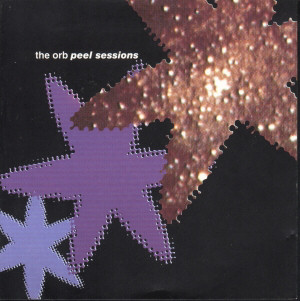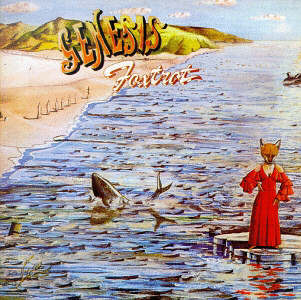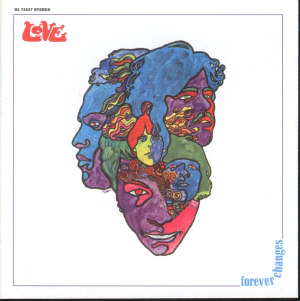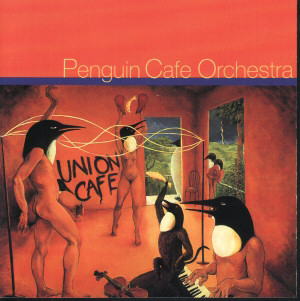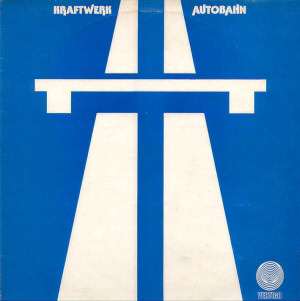Top Five Albums
In reverse order, just to maintain the suspense...
5. The Orb - Peel Sessions (Strange Fruit SFRCD118, 1991)
- A Huge Ever Growing Pulsating Brain That Rules From The Centre Of The Ultraworld (Loving You) (20:12)
- Back Side Of The Moon (Tranquility Lunar Orbit) (10:00)
- Into The Fourth Dimension (Essenes In Starlight) (12:20)
This is in for one reason only. The first track of this album was recorded for John Peel in late 1989, and broadcast on his show not long afterwards. I remember lying in bed in the dark listening to it through headphones. I'd never even heard of The Orb before that night, but I lay in a trance as Alex Paterson and Jimi Cauty's sample-laden soundscape washed around inside my head.
It wasn't the first version of the track that they had recorded, various mixes having appeared on 12" a little while before, but this is the motherlode as far as I'm concerned. Indeed, for days afterwards, Peel's producer (the late and greatly-missed John Walters) kept getting phone calls from people desperately wanting to know where they could buy the track. Well, they had to wait a year or so, but eventually Strange Fruit did the business.
The other two tracks are from a 1990 session and, although nothing like as majestic as the first one, nonetheless show the way to The Orb's epoch-making double-album Adventures Beyond The Ultraworld the year after that. There's even a snatch of I Do Like To Be Beside The Seaside at the end for those who like that sort of whimsy.
4. Genesis - Foxtrot (Charisma CAS1058, 1972)
- Watcher Of The Skies (7:08)
- Time Table (4:35)
- Get 'Em Out By Friday (8:21)
- Can-Utility And The Coastliners (5:36)
- Horizons (1:37)
- Supper's Ready (22:24)
OK, scoff if you like, but the test of the best is how well it stands up to the rigours of time and changing perceptions. By that count, Genesis' fourth album must be accorded legendary status now.
It's staggering to think that this was written and recorded by a bunch of guys who were scarcely into their twenties at the time. Steve Hackett (gtrs) and Phil Collins (drums, backing vcls) had joined before the previous LP, and were now perfectly settled in. It shows. This is an album by a tightly-focussed unit with a clear idea of what they were about.
From the opening mellotron chords of Watcher, it's clear that this LP has force. A cosmic rollercoaster ride later, we have the gorgeously melodic Time Table, in which past and present are shown and contrasted. Get 'Em Out translates the actions of rapacious property developers into an almost sci-fi noir landscape, and Can-Utility tells the legend of Canute in a gradual transformation from slow pastoral to archetypal prog-thrashing.
Side two starts with Steve Hackett's charming short instrumental, before...
...the track which sealed the Genesis and Peter Gabriel legends. Although there had been quite long tracks on previous LPs, this was in a league all of its own. Gabriel's lyrical vision finds its musical counterpart in Hackett's guitar playing (now acoustic and gentle, now fiercely jagged electric) and Tony Banks' powerful keyboard dynamics. There's a sense of humour at play as well, not just in the titles of some of the sections of the piece (like Ikhnaton And Itsacon And Their Band Of Merry Men) but in the famous Willow Farm section, for which Gabriel, live, dressed up in a flower costume. And a ripe one he looked, too.
But then it's into the real meat of the dish, the pounding Apocalypse in 9/8, which concludes with the earth-shattering '666' lyric. After the storm, there must be a calm, and so it is here, before the revelatory final section, concluding with one of the most passionate vocal sections even Gabriel ever produced. "The Lord Of Lords, King Of Kings, has returned to lead his children home / And take them to the New Jerusalem".
Lead on...
3. Love - Forever Changes (Elektra EKS74013, 1967)
- Alone Again Or (3:15)
- A House Is Not A Motel (3:27)
- Andmoreagain (3:18)
- The Daily Planet (3:28)
- Old Man (2:58)
- The Red Telephone (4:45)
- Maybe The People Will Be The Times Or Between Clark And Hilldale (3:31)
- Live And Let Live (5:28)
- The Good Humor Man He Sees Everything Like This (3:05)
- Bummer In The Summer (2:24)
- You Set The Scene (6:51)
If there was ever an album which summed up how cross-pollinated things got in California in Flower Power time, it's the third album from Arthur Lee's extraordinary band.
No mad lysergic thrashings here; Lee's strength was always melody, and it's here in abundance. Add in a couple of tracks penned by guitarist Bryan Maclean (including the classic Alone Again Or), and you can see why this album has come to be regarded as one of the true classics of its time. It is truly mystifying why Forever Changes scarcely charted in the US when it was released. It has everything, not just melody and very competent musical performances, but the slightly acid (in the non-lysergic sense) lyrics of Arthur Lee, which often reach into the surreal and the disturbing (the repeated line in The Red Telephone, "They're locking them up today, they're throwing away the key / I wonder who it'll be tomorrow, you or me?", is not only an echo of what was actually happening in Reagan's California and elsewhere, but worryingly prophetic in view of Lee's own dubious conviction on firearms charges by the same state less than 30 years later).
What made this album sound different to nearly all its contemporaries was the prominence given to strings and brass in the arrangements. Lee and producer Bruce Botnick have since gone on record about their enthusiasm for the style of Herb Alpert, but it wasn't hip to admit to that at the time. You could still tell, however.
This is an album whose classic status is now assured, and Arthur Lee (who recently toured the UK, having himself been 're-released') can now properly be categorised in the genius class on the strength of this work alone.
2. Penguin Café Orchestra - Union Café (Zopf 518 410 2, 1993)
- Scherzo And Trio (6:52)
- Lifeboat (Lovers Rock) (7:13)
- Nothing Really Blue (5:18)
- Cage Dead (4:33)
- Vega (10:15)
- Yodel 3 (3:24)
- Organum (3:49)
- Another One From Porlock (2:57)
- Thorn Tree Wind (3:16)
- Silver Star Of Bologna (4:01)
- Discover America (3:01)
- Pythagoras On The Line (1:51)
- Kora Kora (3:02)
- Lie Back And Think Of England (4:19)
- Red Shorts (4:07)
- Passing Through (5:20)
Simon Jeffes was, undoubtedly, one of the most interesting composers of the last thirty years. Here, with his legendary ensemble, he gives a tour de force in what was to prove the P.C.O.'s final set of new material.
The styles and influences are as varied as ever: Scherzo And Trio is a storming opener, with strings and piano much to the fore; Nothing Really Blue has a melody that even pop writers would have killed for (rather like Jeffes' earlier Southern Jukebox Music); Cage Dead is a suitably minimalist concept to commemorate the passing of the composer whose most famous work is four and a half minutes of silence, consisting as it does of two groups of instruments, one playing the sequence C-A-G-E, and the other D-E-A-D; Another One From Porlock consists of a repeating sequence of five chords with fiddle and piano repeating another tune over it; Thorn Tree Wind is all about texture, played on the electric aeolian harp; and Discover America is an extremely deft commingling of a number of tunes traditionally associated with that country, done with great skill and without any sense of straining after an effect.
Throughout this album, the impression is one of enjoyment, and the notion that music should be fun. Sadly it was not to last, as Simon Jeffes was diagnosed with a brain tumour a couple of years later, and died in late 1997 at the age of 49. His music lives on however; indeed Scherzo And Trio is now used as the theme for BBC Radio 4's Round Britain Quiz, and other Jeffes pieces are regularly used on radio and television, even in advertising (remember the One-2-One ads? That was one of his).
1. Kraftwerk - Autobahn (Vertigo 6360 620, 1974)
- Autobahn (22:43)
- Kometenmelodie I (6:41)
- Kometenmelodie II (5:28)
- Mitternacht (3:41)
- Morgenspaziergang (4:02)
I had been interested in electronic music for a little while, in the sense that I was intrigued by the pop sounds of Hot Butter (Popcorn) and Chicory Tip (produced by Giorgio Moroder), but my first hearing of the 7-inch version of Autobahn in the early summer of 1975, when I was on the very cusp of my teenage years, was a true revelation. Now, this was essential electronic music, in that it was doing things which the standard instrumentation of rock, pop, jazz and orchestral simply could not do. It had a hook which made it immediately sing-along-able, even though the lyrics were in German (it's become the most dreadful cliché, but you could pretend it was The Beach Boys singing "Fun, fun, fun on the Autobahn"). And the sweeping stereo effects of the middle section of the single edit simply whetted the appetite.
As I said, I was 12 going on 13; what the hell did I know about the musical and aesthestic hinterland of these strange German guys? It didn't matter - having had the single as a birthday present, I simply had to have the album for Christmas. Six months later, I held it in my trembling hands (our house was invariably bloody freezing in December), and rushed upstairs to play it.
It was all that I had hoped it would be. I particularly grew to love the instrumental section immediately after the initial vocal round. That BUM-di-dum, di-DUM-di-dum bass, with the flute and guitar melodies played over the top of it, was a crucial moment in that it proved to me at an early age that electronic music need not be the cold, sterile, soul-less phenomenon which its detractors so often accused it of being.
There is an ambience to the whole piece which is certainly sharp and clear, but in the way that an sunny morning in winter is. Likewise, it takes your breath away, but there is nothing to obscure the view and all is laid clear before your eyes. Or ears.
That Kraftwerk could produce such a vision in an age when the technology was either notoriously unreliable or even had to be invented from scratch, and when sequencing was something you did with a razor blade and sticky tape, is truly remarkable, and serves to add to the legend.
The second side of the LP is worthy of mention too, of course. The two Kometenmelodie (the second being essentially a speeded-up version of the first) are in turns atmospheric and tuneful. I well remember my father listening to Kometenmelodie I and saying, after about five minutes, "When's it going to start?". Mitternacht seems to be giving us a sound-picture of a bat-haunted wine cellar at night, and Morgenspaziergang is a delightful pastoral image for flute and (by the sound of it) electric sparrow.
All in all, a classic album by any valid definition. It showed where Kraftwerk had come from, and showed where they were going with their machine vision.
